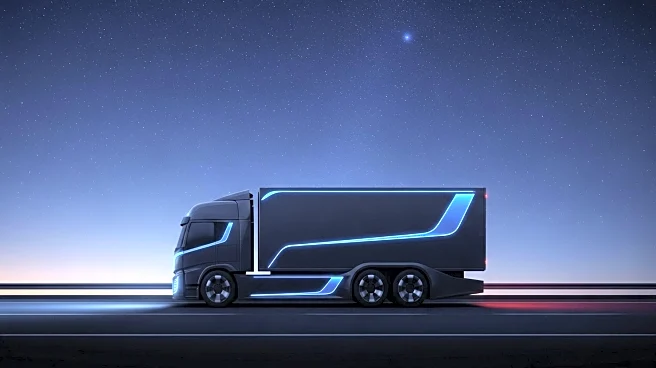What's Happening?
The trucking industry is being encouraged to reassess its powertrain choices due to rapid technological advancements. The North American Council for Freight Efficiency (NACFE) is spearheading this initiative through its 'Run on Less – Messy Middle' program, which begins on September 8. This program aims to collect extensive data on trucks operating on various fuel types, providing insights into the realities of vehicle operations. The initiative highlights the importance of staying updated with technological developments, as solutions that were previously dismissed may now be viable options. The trucking sector is currently navigating a transitional phase, referred to as the 'Messy Middle,' where fleets have multiple powertrain solutions to choose from, with a future goal of zero-emissions powertrain solutions.
Why It's Important?
The call to reevaluate powertrain choices is significant for the trucking industry as it faces increasing pressure to adopt more sustainable practices. With the industry historically reliant on diesel, the shift towards zero-emissions solutions is crucial for reducing environmental impact. This transition presents opportunities for fleets to optimize their operations and potentially reduce costs associated with fuel and maintenance. By embracing new technologies, trucking companies can enhance their competitiveness and align with regulatory trends favoring sustainability. The initiative by NACFE underscores the need for continuous evaluation of technological advancements to ensure that fleets are equipped with the most efficient and environmentally friendly powertrain solutions.
What's Next?
As the 'Run on Less – Messy Middle' program progresses, participating fleets will have access to detailed profiles and metrics that can inform their powertrain decisions. The trucking industry is expected to closely monitor the outcomes of this initiative, which may lead to broader adoption of alternative fuel solutions. Stakeholders, including fleet operators and industry leaders, are likely to engage in discussions about the implications of the collected data and explore partnerships to accelerate the transition to sustainable powertrain technologies. The program's findings could influence future policy decisions and investment strategies within the trucking sector.
Beyond the Headlines
The push for reevaluating powertrain choices in the trucking industry also raises ethical considerations regarding environmental responsibility. As fleets transition to zero-emissions solutions, there is potential for significant reductions in greenhouse gas emissions, contributing to global efforts to combat climate change. Additionally, the adoption of cleaner technologies may improve public health by reducing air pollution. The initiative highlights the cultural shift within the industry towards prioritizing sustainability and innovation, which could lead to long-term changes in how trucking operations are conducted.











